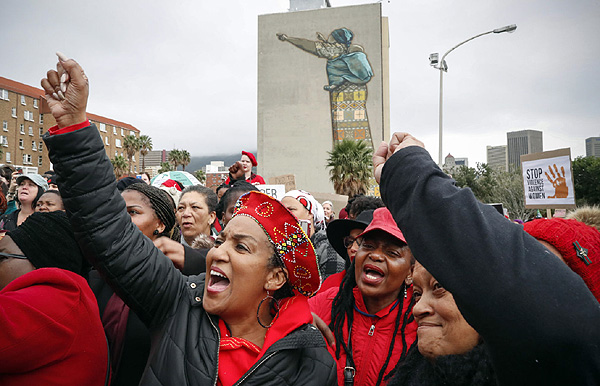 Women are having a disproportionately powerful effect on sub-Saharan African governments and politics. It provides insight to what’s happening in the whole world.
Women are having a disproportionately powerful effect on sub-Saharan African governments and politics. It provides insight to what’s happening in the whole world.
In the modern age African women have always held more political power than western women. They’ve held more public offices and steered more political movements, so at first it doesn’t seem notable the growing numbers of female power brokers emerging in the continent.
But look more carefully and it’s striking.
The Sudan is one of the most conservative, closed societies on earth. Its modern age government has always been a military one, and it has changed several times not by elections but by popular street uprisings.
Street uprisings started almost two months ago when the current military-backed president announced increases in a number of items including bread and petrol. History as our guide, we expected that Omar al-Bashir would be gone by now.
Instead, the military has remained completely supportive and police have ruthlessly put down demonstration after demonstration. It looked like Bashir would prevail until … women started to demonstrate.
In the upscale Wad Nubawi district of Omdurman Sunday, Reuters reported that women first blocked a road then stormed a prison through clouds of tear gas. The area is a posh Khartoum suburb where many of the privileged live. The fact that women of this area defied the establishment is astounding.
Protests against Uganda’s harsh dictator, Yoweri Museveni, have been ongoing for a decade and have become almost an accepted part of Kampala’s daily life. Like Zimbabwe, Museveni allows a highly focused small group of dissent that from time to time obtains concessions but usually just gets beaten to a pulp.
Lately Ugandan women outside the sanctioned opposition movement have challenged the government in daring ways.
Female academics from the university in Kampala have basically shouted they’ve had enough. Stella Nyanzi went on social media with a lot of invective and crude language that took her to jail several times. But her style attracted a wide group of other women and the protests grew, accomplishing several of their demands.
Both of these cases, in The Sudan and Uganda, are not typical of the more historical influences women held throughout Africa. They’re modern-day strident protests and they’ve achieved measures of success that would never have been predicted.
Until last year Ethiopia had been one of the most communist societies on earth. The change is breathtaking and right now half of the governing cabinet plus the (ceremonial) President are women. They join Ethiopia’s first woman chief justice.
Women have not had the historical power in Ethiopia they had elsewhere in Africa. Until the bloody revolutions a half century ago that ended a string of two thousand years of emperors women were completely suppressed.
Even the powerful Coptic Christian religion treated women more as they’re treated in Muslim societies, sequestered in worship and excluded from all ministries. They were often restricted from being taught how to read and refused any paying jobs.
In a half century that slowly changed but in the last few years it exploded.
The long, historical power of women in South Africa accelerated during apartheid. Winnie Mandela became an icon of brash freedom and in her death has become a symbol of liberation. The White Sash movement was instrumental in the dismantling of apartheid.
But in the last few years the abrasiveness of women protests in South Africa is truly notable and marks a real change from the past. Women (and students) on the streets are moving South African politics in ways legislators have been unable. Last August’s demonstrations linked the overall movements to the more global #MeToo movement.
And that’s when the light went off in my head.
Government action in societies all over is being replaced with cultural action: Street protests and campaign rallies are replacing Congressional hearings. Social media campaigns usurp juries.
In Africa, widespread social protests are changing governments on the streets not in voting booths.
This is wild and wooly and a bit frightening, but it’s proof that there are intrinsic social goals government seems currently unable to achieve but the people still can.
It’s global and that’s uncomfortable especially for older persons who cling to their tribal foundations.
It’s manifest most clearly in the emergence of gender equality, but I don’t doubt it will soon manifest goals even more threatening to the global status quo like income equality. The battle over the symbol of “socialism” is replacing the symbol of a “wall.”
As Africa demonstrates politicians now have a very short time to get on the bandwagon and governments better take a few rapid leaps into the future missed over the last several decades if they don’t want to be completely eviscerated. Culture will not be suppressed the same way voting can be.